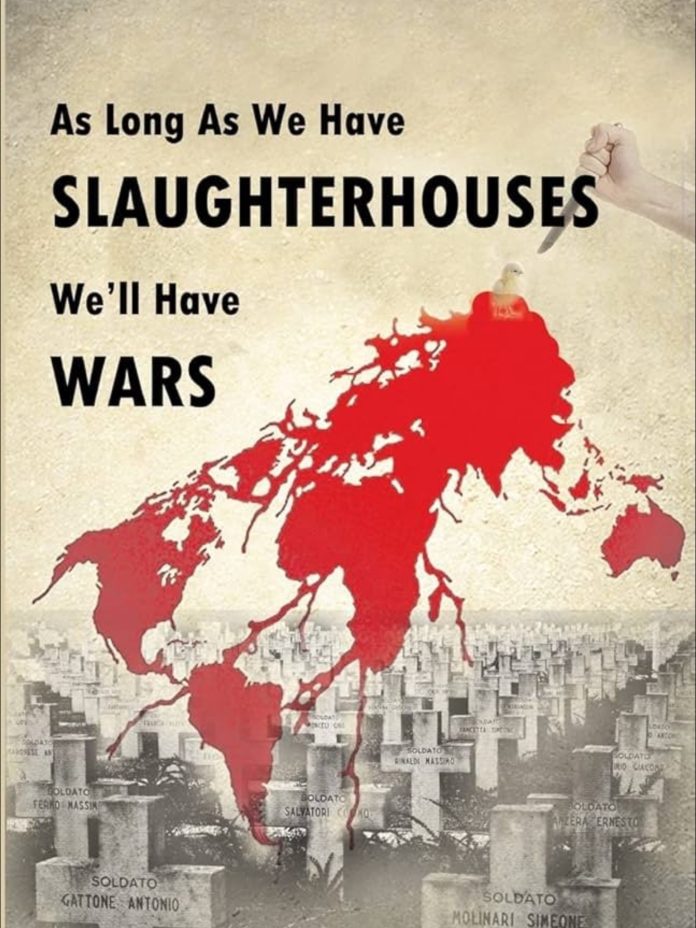The relationship between humanity’s treatment of animals and its propensity for violence towards one another is not merely philosophical speculation; it is a deeply rooted ethical and psychological reality. From ancient thinkers like Pythagoras, who advocated for vegetarianism on moral grounds, to modern-day activists like Peter Singer, who argue for animal liberation, the connection between animal cruelty and human violence has been consistently highlighted. Yet, in a world where industrialised animal agriculture thrives, this connection is often overlooked. The uncomfortable truth is this: until we stop slaughtering animals, we will continue to slaughter each other. The systems that enable the mass killing of animals are the same systems that perpetuate violence among humans.
The Psychology of Desensitisation
At the core of this argument is the concept of desensitisation. The routine slaughter of animals for food, clothing, and other products has normalised violence on an unprecedented scale. Billions of animals are killed each year in conditions that are often brutal and inhumane. This normalisation of suffering and death has a profound psychological impact on society. When we become accustomed to violence against animals, it becomes easier to justify violence against people. The mechanisms that allow us to compartmentalise the suffering of animals, othering, dehumanisation, and indifference, are the same mechanisms that fuel wars, genocides, and systemic oppression.
Consider the language we use to describe animals raised for food. They are referred to as “livestock,” “stock,” or “units,” terms that strip them of their individuality and sentience. This linguistic dehumanisation (or more accurately, de-animalisation) mirrors the language used in human conflicts. Enemies are often described as “vermin,” “pests,” or “animals” to justify their extermination. The psychological distance created by this language makes it easier to inflict violence. When we reduce living beings to mere objects, we pave the way for cruelty, whether the victims are animals or humans.
Historical and Philosophical Perspectives
History provides ample evidence of the link between animal cruelty and human violence. In the 18th century, philosopher Jeremy Bentham argued that the moral question was not whether animals could reason or speak, but whether they could suffer. His ideas laid the groundwork for modern animal rights movements, but they also highlighted a broader ethical principle: the capacity for empathy. When we extend empathy to animals, we strengthen our capacity for empathy towards fellow humans. Conversely, when we suppress empathy for animals, we risk eroding it for humanity as well.
Leo Tolstoy, the renowned Russian writer and philosopher, famously said, “As long as there are slaughterhouses, there will be battlefields.” Tolstoy recognised that the violence inherent in killing animals for food was inseparable from the violence humans inflict on each other. He believed that a society built on the exploitation of animals could never achieve true peace. This sentiment was echoed by Mahatma Gandhi, who argued that the moral progress of a nation could be judged by how it treated its animals.
The Industrialisation of Violence
The rise of industrialised animal agriculture has intensified this moral disconnect. Factory farming, with its conveyor belts of death and sterile efficiency, reduces living beings to mere commodities. Animals are confined to cramped, unsanitary conditions, subjected to mutilations without anaesthesia, and slaughtered en masse. This objectification is not limited to animals; it spills over into human interactions. When we view animals as disposable, we inch closer to viewing people in the same way.
The environmental impact of animal agriculture further underscores the connection between animal exploitation and human suffering. The industry is a leading driver of deforestation, climate change, and resource depletion. These environmental crises disproportionately affect the world’s poorest communities, exacerbating inequality and conflict. The violence inflicted on the planet through unsustainable farming practices is a form of indirect violence against humanity. By perpetuating these systems, we are complicit in a cycle of harm that extends far beyond the slaughterhouse.
The Myth of Necessity
Critics of this argument often claim that eating meat is a biological imperative, rooted in our evolutionary history. While it is true that humans are omnivorous, this argument ignores the reality of modern food systems. We no longer live in a world where hunting for survival is necessary. With advances in plant-based alternatives and lab-grown meat, we have the means to transition away from animal agriculture without sacrificing nutrition or taste. The question is no longer one of necessity but of choice. And the choice to continue slaughtering animals reflects a deeper moral failing; one that has consequences for how we treat each other.
A Path to Peace
The path to a more peaceful world begins with confronting the violence we inflict on animals. By rejecting the systems that perpetuate this violence, we can begin to rebuild our capacity for empathy and compassion. This is not merely an animal rights issue; it is a human rights issue. The same systems that enable the exploitation of animals also enable the exploitation of humans. Whether it is the worker in a slaughterhouse facing dangerous working conditions or the communities displaced by deforestation for cattle ranching, the victims of animal agriculture are both human and non-human.
To break the cycle of violence, we must transition to a more ethical and sustainable food system. This means supporting plant-based diets, advocating for animal welfare reforms, and investing in alternative technologies like lab-grown meat. It also means challenging the cultural norms that normalise violence against animals and, by extension, against humans.
In summary, the choice before us is clear. We can continue to perpetuate a system built on violence and exploitation, or we can choose compassion and justice. Until we stop slaughtering animals, we will continue to slaughter each other, trapped in a cycle of violence that diminishes us all. As Tolstoy wisely observed, the existence of slaughterhouses and battlefields are intertwined. By dismantling the systems that enable animal cruelty, we take a crucial step towards building a more peaceful and equitable world. The time to act is now. The future of both animals and humanity depends on it.







